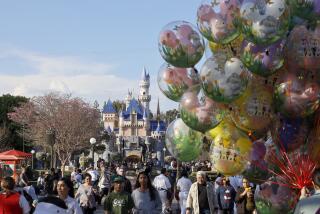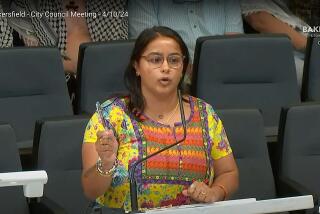Turning a Lens Homeward
A year ago, high school junior Stephanie Cisneros had never heard the word “gentrification,” but in many ways, she already knew what it meant. She was watching it happen all around her in the Echo Park neighborhood she’s called home since she was 5 years old.
Stephanie saw working-class neighbors losing their rental units, only to see the apartments revamped and priced far higher than before.
She saw old storefront businesses close and disappear. Familiar faces, gone.
“I said, ‘What’s going on here?’ ” Stephanie recalled.
Curious and troubled, she began carrying a borrowed digital camera around the neighborhood to document the changes.
On Saturday night, Stephanie’s 17th birthday, the public got an early peek of her work during a screening of a short cut of the film she’s making on the neighborhood’s gentrification. It prompted a discussion on recent changes in the neighborhood.
“It reflected the sentiments of the community,” said Humberto Flores, 34, a film student who attended the screening at the volunteer-run Echo Park Film Center on Alvarado Street, itself fighting a proposed tripling of its rent. “The neighborhood is coming up ... but some are getting pushed out.”
Flores added: “If I were to leave my apartment ... it would go up $400.”
It’s a view that many others have been expressing in Echo Park, where the overwhelming forces of Southern California’s tight housing market have been causing gradual shifts in the neighborhood’s demographics and income levels.
Residential and commercial prices have been rising rapidly, forcing out low-income working families and young bohemians.
Stephanie, who lives with her two younger sisters and parents, immigrants from Mexico City, said a former landlord often reminded the family that their apartment could command two or three times their roughly $500 monthly rent.
That spurred Stephanie, a student at Downtown Magnets High School, to action.
Since June, she has spent hours interviewing business owners and residents on weekends and after school. She has researched the area’s history, the Greater Echo Park Elysian Neighborhood Council and housing cooperatives.
With help from multimedia coordinator Jerold Kress at the Bresee Foundation’s community center near Koreatown, Stephanie hopes to finish the film by next summer and may enter it in competitions.
“My whole bent is youth should tell their own stories,” said Kress, of Echo Park. “It’s not CNN coming in and doing a story on Echo Park. She has the experience. It’s her family and friends that are affected by what’s happening.”
“I really didn’t think I was going to start this project.... A lot of people my age don’t know what gentrification is,” said Stephanie, a first-time filmmaker who borrowed digital cameras and editing equipment from the Bresee Foundation, a nonprofit community outreach organization. “But when they finally closed Pioneer Market, I said, ‘OK, I am doing this.’ ”
Stephanie was referring to the decades-old supermarket at Sunset Boulevard and Echo Park Avenue that closed in August. Though workers’ compensation costs -- not rent prices -- forced the owner to close the store, many residents saw its departure as a symbol of the changes in Echo Park.
Several people in Stephanie’s film described the loss of Pioneer Market, with its hometown feel and stock of Latino and Asian products, as a blow to Echo Park’s character. Stephanie shot footage inside the store in its final days, the sparse shelves providing a striking contrast to earlier images of a bustling business.
A Walgreens drugstore is replacing the market. For weeks, a banner announcing the store’s arrival has hung on a fence near the store, a thick black line scratched through the store’s name and the word “No” scribbled over it.
In recent months, Echo Park’s transformation has drawn protests.
On the morning of the neighborhood council elections in December, protesters marched down Sunset Boulevard, decrying the area’s “reurbanization.” And the issues have been discussed at length in passionate and often heated exchanges on a popular online message board for Echo Park residents and activists.
Councilman Eric Garcetti, who represents the area, has held forums and tenants’ rights seminars, and is pushing for stricter rent stabilization laws and low-cost housing. But changes to the area are hard to resist, said Josh Kamensky, his spokesman.
“There’s a sort of unstoppable cycle, of people working hard to make their neighborhood a nice place to live, and that attracts developers,” Kamensky said.
Some residents see the changes as significant, but not yet cause for alarm. Andrew Garsten, a longtime Echo Park activist and a member of the neighborhood council, said some “unscrupulous landlords” had taken advantage of non-English-speaking immigrants, pushing them out of their apartments. But for the most part, Echo Park has retained its identity as a welcoming place, he said.
“No matter how high and crazy things have gotten here, it’s still affordable compared to other places,” Garsten said. “It’s just higher than it’s ever been before. I don’t think the neighborhood has been changing that fast.”
Stephanie said she was trying to capture the views of the working-class, mostly immigrant residents of Echo Park, who she said hadn’t been given enough information on what the changes mean.
“There’s always two sides to a story. I also want to show how [the changes] will improve the area,” Stephanie said. “I want to show this to the people on the other side of gentrification and have them pay attention to the tenants, to the residents of Echo Park, and not make them feel unwelcome.”
After Saturday’s screening, Stephanie stood a little nervously before the audience. She listened to audience members offer their views on gentrification from their experiences in Venice and Santa Monica.
“Hopefully, you’ll be able to spread the word,” she said. “Learn from this. I want this to be a tool for other people.”
More to Read
Start your day right
Sign up for Essential California for news, features and recommendations from the L.A. Times and beyond in your inbox six days a week.
You may occasionally receive promotional content from the Los Angeles Times.






